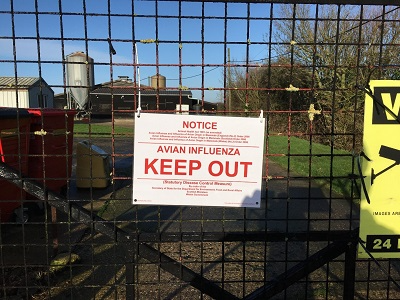News from our partners: Avian flu biosecurity requirements
News from our partners National Trading Standards
The Government has put in place requirements for biosecurity measures to attempt to control the spread of avian influenza.
It is a legal requirement for all bird keepers to follow strict biosecurity measures
Following an increase in the number of detections of avian influenza (AI) in wild birds and on commercial premises, the Chief Veterinary Officers from England, Scotland and Wales have declared an Avian Influenza Prevention Zone (AIPZ) across Great Britain to mitigate the risk of the disease spreading amongst poultry and captive birds.
This means that from this week (Monday 17 October 2022), it will be a legal requirement for all bird keepers in Great Britain to follow strict biosecurity measures to help protect their flocks from the threat of avian flu.

Avian flu legal restrictions
In a joint statement the Chief Veterinary Officers for England, Scotland and Wales said:-
“Bird keepers have faced the largest ever outbreak of avian flu this year and with winter brings an even more increased risk to flocks as migratory birds return to the United Kingdom. Scrupulous biosecurity and hygiene measures is the best form of defence, which is why we have declared an Avian Influenza Prevention Zone (AIPZ) across Great Britain, meaning that all bird keepers must take action to help prevent the disease spreading to more poultry and other domestic birds. The introduction of an AIPZ means regardless of whether you keep a few birds or thousands, you are legally required to meet enhanced biosecurity requirements to protect your birds from this highly infectious disease.”
Keepers with more than 500 birds will need to restrict access for non-essential people on their sites, workers will need to change clothing and footwear before entering bird enclosures and site vehicles will need to be cleaned and disinfected regularly to limit the risk of the disease spreading.
Backyard owners with smaller numbers of poultry including chickens, ducks and geese must also take steps to limit the risk of the disease spreading to their animals.
The introduction of an AIPZ follows a decision to raise the risk level for avian influenza incursion in wild birds in Great Britain from ‘medium’ to ‘high’. For poultry and captive birds the risk level has been raised from ‘medium’ to ‘high’ at premises where biosecurity is below the required standards, and from ‘low’ to ‘medium’ where stringent biosecurity measures are applied.
The nationwide AIPZ builds on the additional biosecurity measures that were brought in last week as part of the regional housing order which covers Norfolk, Suffolk and parts of Essex.
The AIPZ, now in force across Great Britain, does not include a nationwide requirement to house birds. However, this is being kept under constant review.
The AIPZ will be in place until further notice and will be kept under regular review as part of the government’s work to monitor and manage the risks of bird flu.
Further information
For more information please see the media story on GOV.UK.

